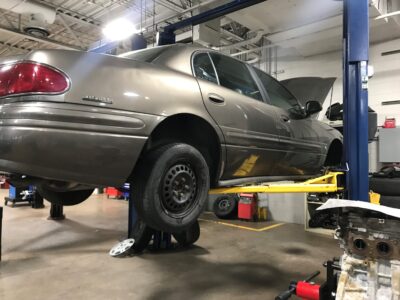By Mark Kozemko, Johnson College’s Automotive Technology Program Director. Originally published in the September 24, 2021 edition of the Valley Advantage.
As another summer goes in the record books and everyone starts to plan their winter travels, questions about vehicle maintenance continue to be on everyone’s minds. This month, we’re fielding questions from concerned vehicle owners about the infamous maintenance schedule they find in their owner’s manuals.
Our first question is, “I often wonder, do I really have to do the maintenance at every single interval on the schedule?”
If you’re scratching your head about the question, let me explain it. A typical maintenance schedule found in your vehicle’s owner’s manual will be in table form, listing mileage intervals across the top and maintenance items down the left side. The manufacturer determines the mileage intervals.
For instance, my 2017 Ram 1500 pickup mileage intervals are every 10,000 miles beginning at 20,000 miles. There is also a row with years that appears under the mileage. Some of us don’t drive as much, so maintenance is completed yearly instead of according to miles traveled.
Maintenance items that need attention range from a simple inspection of that item to total replacement. Many things don’t need to be replaced for 50,000 to 100,000 miles. Items that require regular replacing include the engine oil and filter, fuel and air filters.
Okay, now to answer the question asked: Yes, you really have to do the maintenance listed at every mileage interval. Why? Well, replacement or inspections are done at specific intervals to prevent significant repairs in the future, thus, the term, “preventative maintenance.” When preventative maintenance is performed correctly, the owner will get as much out of their vehicle as they possibly can.
If you’ve been following this column every month, you may remember me stating that engine oil changes are the cheapest maintenance you can do to prolong the life of your engine. A clean engine is a happy engine and will perform flawlessly for quite a long time. That’s just one example of preventative maintenance.
“Are all the services the same at each interval?” is our second question.
There may be certain things, such as changing the engine oil and filter that you will have to do at each interval. Other things, not so much. For example, the spark plugs in my 5.7-liter Hemi engine require replacement at 100,000 miles, so if you remember from above, the service intervals on my vehicle are every 10,000 miles. My truck will have already received somewhere around 10 maintenance services by the time I replace my spark plugs.
I want to add that this spark plug replacement requirement is different from a few decades ago, when replacements were required every year. Back then, this was called a tune-up.
Some items are inspected at each interval but do not need to be replaced until they reach the end of their useful life. For instance, an air filter may last through four service intervals if the vehicle is only driven in a clean, dust-free environment. If you drive your car or truck in very dirty or dusty situations, the filter will have to be replaced every interval due to severe usage.
Our third question is, “Can I get away with skipping any of the services?”
I guess you can, but you may hear someone tell you, “I told you so,” because something simple that needed attention at the service interval you skipped turned into a high-dollar repair later on down the road.
“Is there a more cost-effective way to maintain my vehicle so I don’t have to incur the cost of the maintenance packages?” is our fourth and final question this month.
The bottom line is that the most cost-effective way to maintain your vehicle is to follow the maintenance schedule to the letter. In the long run, the money you spend on the maintenance packages per the schedule will be significantly less than the expensive repairs that will come because you skipped one or more of your scheduled maintenances.
Keep in mind that a vehicle under warranty will always require you to follow the maintenance schedule. If a catastrophic failure should happen to your car or truck, the first thing the manufacturer will ask for is maintenance records. If maintenance hasn’t been completed per their recommended schedule, your repair will most likely come out of your pocket. Those costs can add up very quickly.
As you think about preparing your vehicle for your winter travels, make sure you know what is really recommended and required on your vehicle’s maintenance schedule. It could mean saving money and, more importantly, getting you safely to your winter destination.

